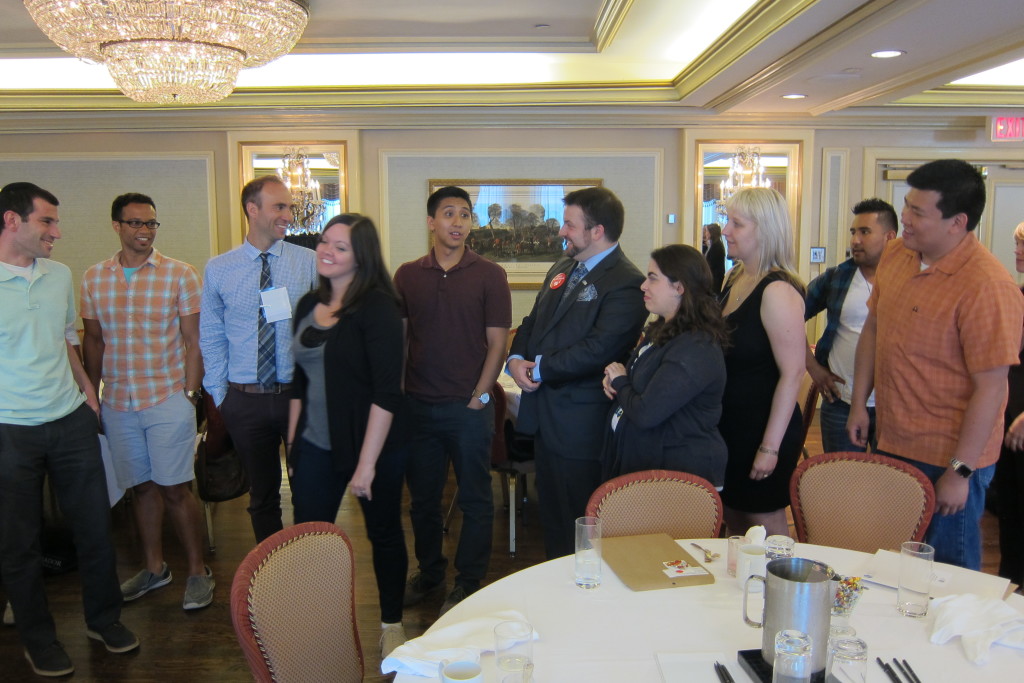
This Denver, Colorado skyline awaits 2016 Conventioneers.
APA Convention is a great way to connect with your peers and with established psychologists. There are so many opportunities for networking, learning, and growth . Convention will be in Denver, Colorado from August 4 through 7, 2016.
We want to help you get there by providing funding through five APAGS Convention Travel Awards, each worth $500 in reimbursement. Additionally, we offer registration fee waivers for all APAGS member first-authors at Convention (learn more in our FAQ). Other directorates in APA (such as Science), along with several divisions, also offer special funding opportunities.
The deadline to submit a poster or program proposal is Tuesday, December 1 at 5pm Eastern. Don’t miss your opportunity to present at Convention and get connected!
One of last year’s travel grant winners — a doctoral student at Auburn University — shared her experiences with me about the process of applying for funds to attend the APA Convention in Toronto.
Heather Dade: Why did you decide to apply for our Convention Travel Award?
Anne Conroy: I was excited at the opportunity to attend sessions, devote time to my professional development, and explore new surroundings. I was going to get the opportunity to assist with my first symposium, and I was going to view the posters of my colleagues and friends.
Heather: We’re happy you applied. Tell me what you first thought about Convention when you got to Toronto.
Anne: My excitement was somewhat replaced by a feeling of anxiety. I was overwhelmed by the size of, well, everything: The Convention guide resembled a phone book, and there was a sea of psychologists spread in every direction who seemed to know what they were doing. How was I going to get the most out of this experience?
Heather: What did help you get a handle on this Convention?
Anne: Attending the APAGS orientation and connecting with other APAGS ambassadors helped me feel less overwhelmed and made the convention seem more manageable. As the conference progressed, I started to see familiar faces in the vast sea of psychologists and psychologists-in-training, which gave me reassurance that I would not be forever lost in my attempts to navigate from session to session. I enjoyed conversing with my fellow APAGS ambassadors, many of whom were also attending their first APA conference. We bonded over our mutual bewilderment at the sheer magnitude of the conference, along with our desire to make the most of the experience.

APAGS Ambassadors play a warm-up game during orientation in Toronto, August 2015 .
Heather: Anne, how did you figure out how to fill your time at Convention?
Anne: In determining my schedule, I decided to attend several of the APAGS sessions, with the hope that attending programs geared toward graduate students would give me useful pieces of information to apply upon returning home. I attended a session entitled, “Set Goals, Say No, and Still Graduate,” where I was able to create a timeline for completing my dissertation proposal, broken down into small, digestible pieces. I was thoroughly pleased when I left the session, as I had a workable, reasonable time frame to present to my adviser! I plan on applying the strategies learned in that session to other academic pursuits, including data collection and dissertation defense.
Heather: Did you go to anything else at Convention that you liked?
Anne: Another APAGS session that provided me with incredibly beneficial information was the Internship Workshop. While I am still at least one year away from applying for internship, I found the information to be useful in dispelling my fears around internship essays, selection of sites, and the like. I took copious amounts of notes regarding how to communicate my personal and professional identity to site directors, along with tips regarding scheduling interviews and how to avoid being overwhelmed by the process. I was so impressed with the APAGS programming at the convention that I encouraged other members from my program to attend APAGS sessions.
Heather: What would you say to another student who was considering applying?
Anne: I received numerous benefits beyond the monetary prize, including gaining valuable pieces of information that will serve me well as I continue my education and gaining contacts to whom I can reach out with questions. I encourage all who are interested in applying to do so for next year’s convention. You won’t regret it!


